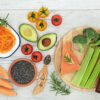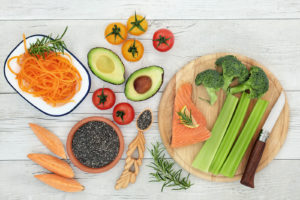
Are You Lacking Proper Nutrients for Your Eyes?
It’s no secret that vitamins and minerals are important for your eye health. Vitamins do a range of things for your eyes, from preventing disease to maintaining visual acuity. But what happens when you don’t get enough nutrients for your eyes?
For your eyes to be as healthy as possible, they need a full range of nutrients every day. Vision can deteriorate from various diseases and disorders that result from nutrient deficiencies. You may not know you’re deficient in something until it’s too late. There’s a whole list of all the nutrients your eyes need and risks that come with being deficient in them. Here, we talk about what happens when you don’t get enough of certain nutrients and how to increase your intake.
Vitamin A
A deficiency in vitamin A can cause a range of diseases, all under the xerophthalmia umbrella. This includes corneal ulceration and melting, retinopathy, night blindness, and dry eyes. It’s also necessary for proper immune system function. The most common reasons for not getting enough vitamin A are malnourishment, malabsorption, and poor vitamin metabolism.
In fact, since many children in the developing world suffer from malnourishment, they are also vitamin A deficient. However, even if they get enough vitamin A, they can still be deficient if they suffer from liver disease. The liver is required to metabolize vitamins for the body. Deficiency in vitamin A is the leading cause of childhood blindness in the developing world.
Ensuring children in the global south get enough nutrients is a multi-faceted challenge that can’t be solved overnight. However, people all over the world can improve their eye health by incorporating foods that are rich in vitamin A. These foods include milk, meat, fish, eggs, leafy greens, and yellow fruit.
Antioxidants
Antioxidants are critical to your eye cells’ ability to prevent oxidation from free radicals from occurring. Since the macula and retina are so dependent on oxygen to function, they need extra protection from oxidation. When you are deficient in antioxidants, oxidation can occur and result in higher chances of suffering from macular degeneration. Since age plays a part in eye health, age-related macular degeneration (AMD) can also be sped up due to antioxidant deficiency. However, in one study, antioxidants in the diet were able to decrease the participant’s risk for AMD by 25 percent. That’s a substantial decrease in risk.
Antioxidants also decrease the risk of cataract development. The study above also reported that antioxidant vitamins, like C and E, could decrease the progression of existing cataracts. That’s in addition to preventing them from forming. Cataracts are a highly common eye health issue in America. Cataract surgery is the most common surgical procedure with over two million performed in America each year. Such a common health issue can be resolved by increasing your antioxidant intake.
You can find antioxidants in berries, dark chocolate, nuts, seeds, leafy greens, etc. Most people don’t get enough antioxidants in their daily diet. Simply adding additional servings of fruits, veggies, and mixed nuts can impact your antioxidant levels and your eye health.
Zinc
Zinc is an essential trace mineral not created by our bodies but sourced from our diet. It has multiple benefits for our overall health and specifically our eye health. Zinc slows down the progression of AMD, visual acuity loss, and prevents the onset for those who are high risk. When someone has a deficiency in zinc, they can suffer from poor night vision, cloudy cataracts, and become more vulnerable to infections. In fact, zinc is responsible for transferring an important pigment that protects the retina from damage and infection. It’s called melanin and it transfers from the liver to the eyes. Without zinc, you are at a higher risk for retinal damage, infection, and disease.
If you are already at high risk for AMD, you should consider increasing your zinc intake greatly. Most people can benefit from more zinc since it’s common to be deficient in it. But those who are at risk for AMD specifically need to make a change to their diets. You can find zinc in poultry and red meats, as well as beans and mixed nuts.
Omega 3-Fatty Acids
Omega-3s are critical to your eyes’ drainage of intraocular fluid, preventing glaucoma and protecting them from macular degeneration. Our eyes naturally produce different clear fluids that keep the eyeballs moist and flush out toxins. When these fluids can’t drain properly, they build up and put pressure on the eyes. High eye pressure can result in glaucoma development and even permanent vision loss. Luckily, by ensuring you are getting enough omega-3s in your diet, you can prevent these eye health issues.
Omega-3s are also able to prevent and treat dry eye syndrome, an issue often caused by various medications and existing diseases. It’s important to note that omega-3s and omega-6s are different and cannot be used interchangeably in your diet. Omega-3s are the healthy fats that come from salmon, tuna, flax seed, and dark leafy greens. You can find omega-6s in deep-fried foods and cooking oils. They’re also important to the body, but in far fewer doses than omega-3s. Your ratio should be 4-1 omega-3s to omega-6s.
Other Foods to Incorporate into Your Diet
If your diet is lacking nutrients that benefit eye health, here is a list of additional foods to add. Some of these include the nutrients mentioned in this article as well as many more.
 Chia seeds
Chia seeds- Eggs
- Salmon
- Spinach
- Cinnamon
- Almonds
There are many more eye-benefitting foods out there. These are just a few examples that most people can incorporate into their diets.
Interested in Learning More?
Your eye health should be a priority when it comes to creating a healthy lifestyle and choosing the right foods. Unlike other muscles, the eyes are working the entire time you’re awake. For all that work, it’s only right to treat them with respect and all the nutrients they need. While getting these nutrients from food is best, you can also use a natural supplement.
You can prevent certain eye conditions by changing your diet. Investing in your diet today could save you a lot of pain and money later on in life, so be on the lookout for more ways to incorporate these nutrients into your regular meal planning.
Our Rebuild Your Vision Ocu-Plus Formula Contains All 17 Vitamins, Minerals, and Herbal Supplements to Improve Your Eye Health!




Hi I am interested in your site , I had a stroke in 2012 which has resulted in my being left hemiplegic I haveaslight lower left cut off in my vision and am having t have peripheral vision tests to satisfy the driving regulations in the UK (DVLAJ) I ave been taking your ocuvision tablets fort about six months now and hope to pass the peripheral vision test shortly
Best regards Geoff Hamilton